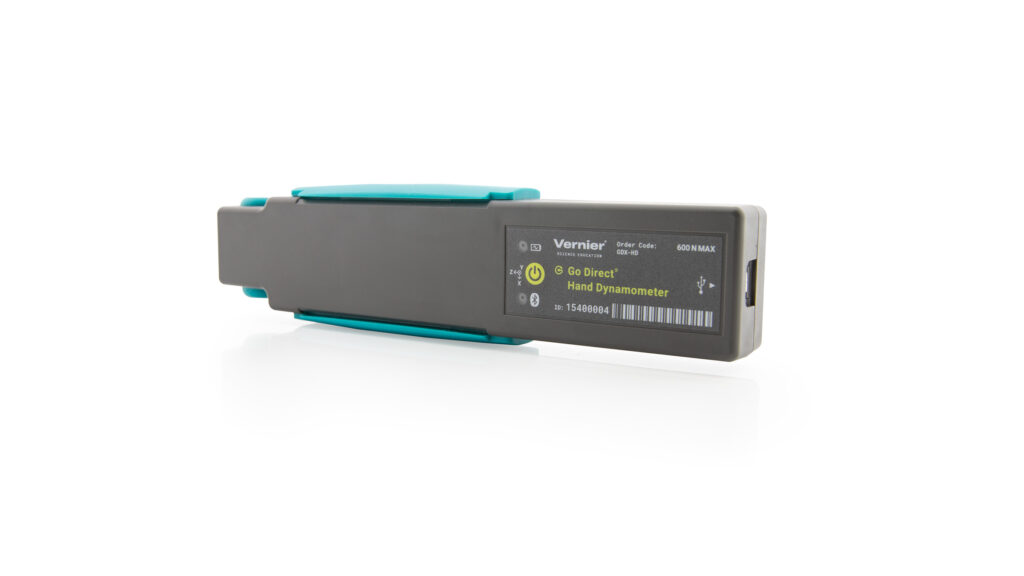Go Direct® Hand Dynamometer User Manual
Order Code: GDX-HD
Go Direct Hand Dynamometer can be used to measure grip and pinch strength and to perform muscle fatigue studies. This sensor connects directly to student devices via Bluetooth® wireless technology or USB. Students can correlate muscle strength and fatigue when they pair Go Direct Hand Dynamometer and Go Direct EKG.
Go Direct Hand Dynamometer can be used in a variety of experiments:
- Observe the effect of a conscious effort to overcome fatigue on hand grip strength.
- Correlate grip strength with arm circumference or height.
- Correlate measurements of grip strength and electrical activity with muscle fatigue.
- Evaluate grip strength and different limb positions.
Note: Vernier products are designed for educational use. Our products are not designed nor are they recommended for any industrial, medical, or commercial process such as life support, patient diagnosis, control of a manufacturing process, or industrial testing of any kind.
What's Included
- Go Direct Hand Dynamometer
- Micro USB Cable
Compatible Software
Choose a platform below to see its compatibility requirements.LabQuest
Interface LabQuest App LabQuest 3 Full support LabQuest 2 Full support 1 LabQuest Incompatible Compatibility Notes
Computers
Software Interface Graphical Analysis Graphical Analysis (Web App) No interface required Full support Full support LabQuest 3 Full support 1 Incompatible LabQuest 2 Full support 1 2 Incompatible Compatibility Notes
Chromebook
Software Interface Graphical Analysis (Web App) No interface required Full support iOS
Software Interface Graphical Analysis Graphical Analysis GW No interface required Full support Incompatible LabQuest 3 Full support 1 2 Full support 1 LabQuest 2 Full support 1 2 3 Full support 1 3 Compatibility Notes
Android
Software Interface Graphical Analysis Graphical Analysis GW No interface required Full support Incompatible LabQuest 3 Full support 1 2 Full support 1 LabQuest 2 Full support 1 2 3 Full support 1 3 Compatibility Notes
Python
Software Interface Python No interface required Full support Javascript
Software Interface Javascript No interface required Full support 1 Compatibility Notes
LabVIEW
Software Interface NI LabVIEW No interface required Full support
Quick Start: Vernier Graphical Analysis® and Bluetooth®
- Charge your sensor for at least 2 hours before first use.
- Turn on your sensor. The LED will blink red.
- Launch Graphical Analysis, then click Sensor Data Collection.
- Select your sensor from the list. The sensor ID is located on the sensor label near the bar code. Note: If you don’t see a list of available sensors, click WIRELESS. After selecting your sensor, click Pair.
- This is a multi-channel sensor. Click SENSOR CHANNELS and select the channel(s) you want to use.
- Click DONE. You are now ready to collect data.
Using other Vernier data-collection apps or want to connect via USB?
Visit www.vernier.com/start-go-direct
Note: This sensor also works with LabQuest 2 and LabQuest 3; it does not work with the original LabQuest.
Charging the Sensor
Connect Go Direct Hand Dynamometer to the included USB Charging Cable and any USB device for two hours.
You can also charge up to eight Go Direct Hand Dynamometer Sensors using our Go Direct Charge Station, sold separately (order code: GDX-CRG). An LED on each Go Direct Hand Dynamometer indicates charging status.
| Charging |
Orange LED next to the battery icon is solid while the sensor is charging. |
| Fully charged |
Green LED next to the battery icon is solid when the sensor is fully charged. |
Powering the Sensor
| Turning on the sensor |
Press button once. Red LED indicator next to the Bluetooth icon flashes when the unit is on. |
| Putting the sensor in sleep mode |
Press and hold button for more than three seconds to put into sleep mode. Red LED indicator next to Bluetooth icon stops flashing when sleeping. |
Connecting the Sensor
See the following link for up-to-date connection information:
Connecting via Bluetooth Wireless Technology
| Ready to connect | Red LED next to the Bluetooth icon flashes when sensor is awake and ready to connect. |
| Connected | Green LED next to the Bluetooth icon flashes when sensor is connected via Bluetooth wireless technology. |
Connecting via USB
| Connected and charging | Orange LED next to the battery icon is solid when the sensor is connected to Graphical Analysis via USB and the unit is charging. LED next to Bluetooth icon is off. |
| Connected, fully charged | Green LED next to the battery icon is solid when the sensor is connected to Graphical Analysis via USB and fully charged. LED next to Bluetooth icon is off. |
| Charging via USB, connected via Bluetooth |
Orange LED next to battery icon is solid when sensor is connected to charger via USB and the unit is charging. Green LED next to Bluetooth icon flashes when sensor is connected via Bluetooth wireless technology. |
Identifying the Sensor
When two or more sensors are connected, the sensors can be identified by tapping or clicking Identify in Sensor Information.
Using the Product
Connect the sensor following the steps in the Quick Start section of this user manual.
- To assess grip strength, hold the sensor in a vertical position so that the fingers and palm of the hand make contact with the sensor pads. Squeeze the sensor so that force is applied to the pads.
- To assess pinch strength, hold the sensor in one hand by the case avoiding contact with the pads. Using your thumb and forefinger of the opposite hand, place each on the opposing pinch pads and squeeze.
- If the default experiment duration is too long for your experiment, change the data-collection parameters in the program you are using.
Channels
Go Direct Hand Dynamometer has seven measurement channels. The channel names are
- Force
- X-axis acceleration
- Y-axis acceleration
- Z-axis acceleration
- X-axis gyro
- Y-axis gyro
- Z-axis gyro
Force
The default channel that is active when the sensor is connected is Force. The force channel measures force applied to the hand or finger grips along the body of the sensor.
Acceleration
There are three acceleration channels, measured by a single chip. An icon on the sensor shows the positive direction for each axis. Each direction of acceleration can be measured separately.
If you choose to activate all three acceleration channels at once, you can create a calculated column for the total acceleration magnitude.
Gyroscope
Use the gyroscope channels to measure the rotation rate of the unit. If you choose to activate all three gyroscope channels at once, you can create a calculated column for the total magnitude of angular velocity.
Calibrating the Sensor
You should not have to perform a new calibration when using Go Direct Hand Dynamometer. We have set the sensor to match our stored calibration before shipping it. You can simply use the appropriate calibration value that is stored in the data-collection program.
Zeroing the Sensor
If the sensor does not read zero in the orientation in which you are using it, follow the standard zeroing procedure for the data-collection program you are using. For additional information, see www.vernier.com/til/4311
Specifications
|
Maximum sampling rate |
10 samples/s |
|
Resolution |
0.1 N |
|
Safety range (maximum force without damage to the sensor) |
0 to 850 N |
|
Operational range |
0 to 600 N |
|
USB specification |
2.0 |
|
Wireless specification |
Bluetooth 4.2 |
|
Maximum wireless range |
30 m (unobstructed) |
|
Battery |
300 mA Li-Poly Rechargeable |
Care and Maintenance
Battery Information
The Go Direct Hand Dynamometer contains a small lithium-ion battery. The system is designed to consume very little power and not put heavy demands on the battery. Although the battery is warranted for one year, the expected battery life should be several years. Replacement batteries are available from Vernier (order code: GDX-BAT-300).
Storage and Maintenance
To store the Go Direct Hand Dynamometer for extended periods of time, put the device in sleep mode by holding the button down for at least three seconds. The red LED will stop flashing to show that the unit is in sleep mode. Over several months, the battery will discharge but will not be damaged. After such storage, charge the device for a few hours, and the unit will be ready to go.
Exposing the battery to temperatures over 35°C (95°F) will reduce its lifespan. If possible, store the device in an area that is not exposed to temperature extremes.
Water Resistance
Important: Go Direct Hand Dynamometer is not water resistant and should never be immersed in water.
If water gets into the device, immediately power the unit down (press and hold the power button for more than three seconds). Disconnect the sensor and charging cable, and remove the battery. Allow the device to dry thoroughly before attempting to use the device again. Do not attempt to dry using an external heat source.
How the Sensor Works
Go Direct Hand Dynamometer is a strain-gauge based isometric force sensor. This sensor amplifies the force applied converting it into a digital signal. Go Direct Hand Dynamometer reports values in newtons (N), pounds (lb), or kilograms (kg).
Troubleshooting
Connect the sensor to the Graphical Analysis 4 app and try the following:
- If the sensor does not read zero in the orientation in which you are using it, follow the standard zeroing procedure for the data-collection program you are using.
For additional troubleshooting and FAQs, including the standard zeroing procedure, see www.vernier.com/til/4311
Repair Information
If you have watched the related product video(s), followed the troubleshooting steps, and are still having trouble with your Go Direct Hand Dynamometer, contact Vernier Technical Support at support@vernier.com or call 888-837-6437. Support specialists will work with you to determine if the unit needs to be sent in for repair. At that time, a Return Merchandise Authorization (RMA) number will be issued and instructions will be communicated on how to return the unit for repair.
Accessories/Replacements
| Item | Order Code |
|---|---|
|
CB-USB-MICRO |
|
|
CB-USB-C-MICRO |
|
| Go Direct 300 mAh Replacement Battery |
GDX-BAT-300 |
Warranty
Warranty information for this product can be found on the Support tab at www.vernier.com/gdx-hd/#support
General warranty information can be found at www.vernier.com/warranty
Disposal
When disposing of this electronic product, do not treat it as household waste. Its disposal is subject to regulations that vary by country and region. This item should be given to an applicable collection point for the recycling of electrical and electronic equipment. By ensuring that this product is disposed of correctly, you help prevent potential negative consequences on human health or on the environment. The recycling of materials will help to conserve natural resources. For more detailed information about recycling this product, contact your local city office or your disposal service.
Battery recycling information is available at www.call2recycle.org
Do not puncture or expose the battery to excessive heat or flame.
 The symbol, shown here, indicates that this product must not be disposed of in a standard waste container.
The symbol, shown here, indicates that this product must not be disposed of in a standard waste container.
Contact Support
Fill out our online support form or call us toll-free at 1-888-837-6437.

